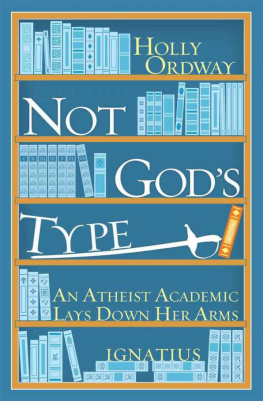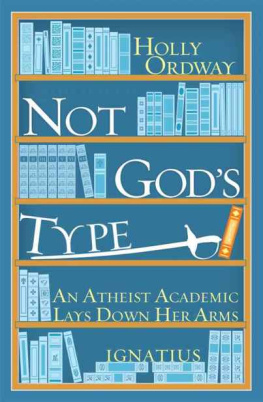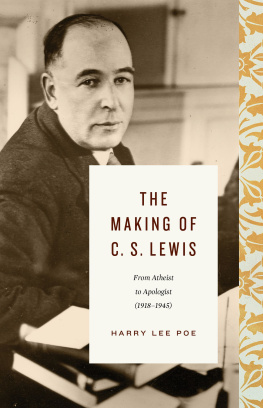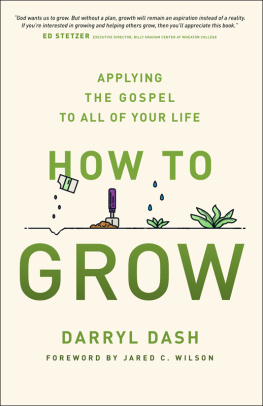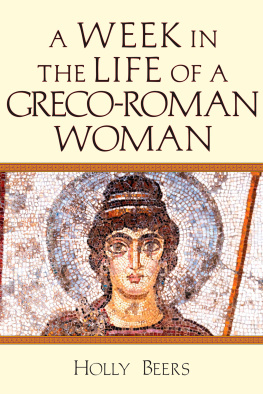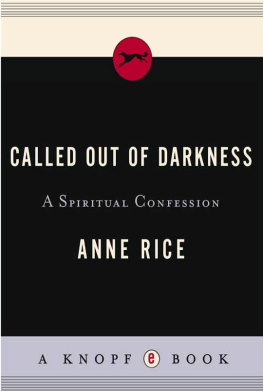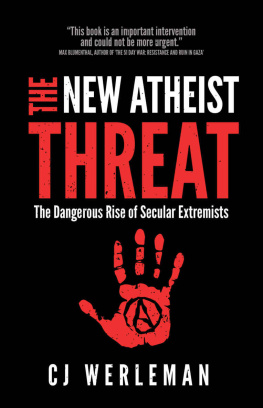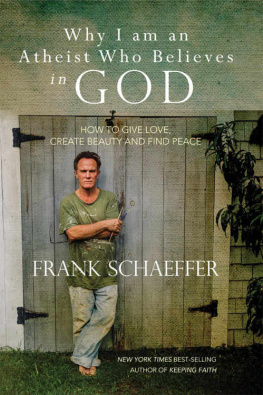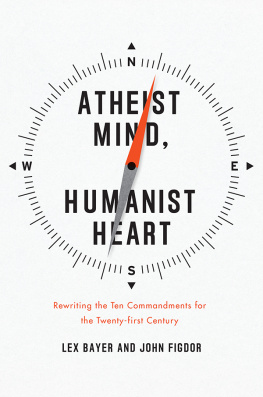NOT GODS TYPE
HOLLY ORDWAY
NOT GODS TYPE
An Atheist Academic
Lays Dow Her Arms
Foreword by
John Mark N. Reynolds
IGNATIUS PRESS SAN FRANCISCO
First edition 2010 by Holly Ordway
Published by Moody Publishers, Chicago, Illinois
All Scripture quotations, unless otherwise indicated, are taken from The Holy Bible, English Standard Version. Copyright 2000, 2001 by Cross-way Bibles, a division of Good News Publishers. All rights reserved.
Those Scripture quotations taken from the Revised Standard Version of the Holy Bible are from the Second Catholic Edition, 2006. The Revised Standard Version of the Holy Bible: the Old Testament, 1952, 2006; the Apocrypha, 1957, 2006; the New Testament, 1946, 2006; the Catholic Edition of the Old Testament, incorporating the Apocrypha, 1966, 2006, the Catholic Edition of the New Testament, 1965, 2006 by the Division of Christian Education of the National Council of the Churches of Christ in the United States of America. All rights reserved.
Cover design by Milo Persic
2014 by Ignatius Press, San Francisco
All rights reserved
ISBN 978-1-58617-893-2
Library of Congress Control Number 2014902185
Printed in the United States of America
Fallen man is not simply an imperfect creature who needs improvement: he is a rebel who must lay down his arms.
C. S. Lewis
[The Prodigal Son] must surrender himself to his lawful Sovereign. He is a runaway offender; he must come back, as a very first step, before anything can be determined about him, bad or good; he is a rebel, and must lay down his arms.
Blessed John Henry Cardinal Newman
St. Michael and All Angels
Michaelmas gales assail the waning year,
And Michaels scale is true, his blade is bright.
He strips dead leaves, and leaves the living clear
To flourish in the touch and reach of light.
Archangel bring your balance, help me turn
Upon this turning world with you and dance
In the Great Dance. Draw near, help me discern,
And trace the hidden grace in change and chance.
Angel of fire, Loves fierce radiance,
Drive through the deep until the steep waves part;
Undo the dragons sinuous influence
And pierce the clotted darkness in my heart.
Unchain the child you find there, break the spell
And overthrow the tyrannies of Hell.
Malcolm Guite
This poem from Sounding the Seasons: Seventy Sonnets for the Christian Year (London: Canterbury Press, 2012).
Contents
Foreword
Intellectuals have given themselves a bad name. Often they seem cut off from the real world or the values that exalt a nation. But there have been and are a few thoughtful people, intellectuals in the positive sense, who love ideas and people.
When I was a young man, the story of C. S. Lewis, the atheist literature professor turned Christian, inspired me to an academic life and now as a university administrator the story of another atheist professor trained in literature who turned to Jesus Christ as an adult motivates me to keep going and to do better than I have done.
Ordway is a new kind of apologist. If Francis Schaeffer pioneered a type of cultural apologetics that our colleague Nancy Pearcey is bringing to maturity, then Ordway is providing a new starting place incarnating a compatible, but unique vision of what it means to be an apologist and a scholar today.
Following twentieth-century examples such as Dietrich Bonhoeffer, Ordway is unafraid of culture and reminds us that we live in the world, even if we are not of the world. We have bodies and souls, souls and bodies, and Ordways apologetic never forgets either one or puts the emphasis on any question in the wrong place.
Some have worshipped creation or used creation care as a slogan for functional materialism. Others use a theology of the body as a start at loosening Christian morals. We have too many Christian academics, Christian intellectuals, and Christian artists for whom Christianity is merely a modifying adjective to the substance of their lives or careers. Ordway is a rarity: a Christian who does things, an academic Christian, an intellectual Christian, and an artistic Christian.
This book shows that the linguistic shift matters.
She accepts the full gospel, not because she always likes it, but because she thinks it the best, truest, and most beautiful idea in human history. Ordway is hardheaded enough to accept the failures of Christians and will not defend our schisms, genocides, or decadence.
She never loses sight of Jesus: incarnate, triumphant, and alive.
I know she is Gods type, but she is not always any type the twenty-first century can handle. She is smart, powerful, feminine, and traditional. Her views are unpredictable, because she forms them on the Word of God.
Some smart folk wish to love Jesus, but prefer to ignore his bride, the Church. This goes no better for these rude people than it does when any loving husband meets a boor who condescends, ignores, or insults his beloved. Ordway loves the people of God, because she loves God. This does not blind her to some of the problems of the visible Church, but her reasoning does not end with easy cynicism.
Ordways story is the story of God planting his word within her, Ordway (eventually!) responding, Let it be done unto me, and then finding her way to an ecclesiastical home. She thinks for herself, but not by herself. She looks for the mind of Christ and the community of faith in all ages.
If I do not share all her conclusions about the nature of the Church, I do share her knowledge that the Church is both visible and invisible. She is not a creature of institutions, but of the Incarnation. She knows that just as men must have bodies to be men, so the bride of Christ must be visible to be a bride of an incarnate Christ.
At the same time, the Church is mystical and fully seen only in paradise. Ordway knows how to reason (ask her students), but she is not afraid to stop and worship when she reaches the ineffable. She has a sense that beauty can be a snare, but it can also be a sign.
Ordways story is one in which fear is replaced by love. God does not fear questions, doubts, worries, or mistakes. He fears nothing, because he is perfect love. Ordway sensed this truth even when she was distant from God and so exchanged her fears and self-doubt for love.
She found a Person, but in finding him also found his family: the Church. She is not so arrogant as to demand that the family live up to her expectations, even when those expectations are justified!
Should a person whom we hope is merely in the middle of her story tell it? If pride was the motivation or self-indulgence, then no Christian could justify a memoir, but this book is in the tradition of the testimony. As a young boy, I loved hearing the saints-in-process of all ages share what Jesus was doing in their lives. Such stories encourage believers to carry on. We know the Church will endure, but we wobble.
The gates of hell will not prevail against the Church, but they often feel like they are crushing me. At that moment the testimony of a believer about the state of her walk with God is most encouraging. Dr. Ordway is a joyful warrior, a status that implies not just good cheer, something she surely has, but a willingness to fight.
I know many culture warriors, but few jolly culture warriors: Holly Ordway is one.
If I had the power, I would declare Dr. Ordway a shield maid of Rohan. If you understand the reference and enjoy it, then you are the kind of student Dr. Ordway inspires every day here at HBU. Like Lewis, Tolkien, or Sayers, Ordway is imaginative and full of living faith, but unlike them she is American. She is a child of her nation, though not in some narrow or jingoistic sense.
Next page
